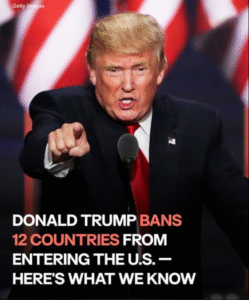
✍️ What the Proclamation Says
On June 4, 2025, President Trump signed a presidential proclamation—titled “Restricting the Entry of Foreign Nationals to Protect the United States from Foreign Terrorists and Other National Security and Public Safety Threats”—initiating a full travel ban on citizens from 12 countries and imposing heightened restrictions on another seven nations, effective at 12:01 a.m. Eastern on June 9, 2025
Full Ban (12 Countries)
-
Afghanistan
-
Myanmar (Burma)
-
Chad
-
Republic of the Congo
-
Equatorial Guinea
-
Eritrea
-
Haiti
-
Iran
-
Libya
-
Somalia
-
Sudan
-
Yemen
Partial Restrictions (7 Countries)
-
Burundi, Cuba, Laos, Sierra Leone, Togo, Turkmenistan, Venezuela
Exemptions
Certain categories are not affected by the ban:
-
Travelers with valid visas issued before June 9, as well as permanent residents and diplomats.
-
Immediate relatives (spouses, minor children, parents) of U.S. citizens.
-
Participants in major sporting events, such as the 2026 FIFA World Cup and 2028 Olympics.
-
Afghans on Special Immigrant Visas (SIVs)—typically those who worked with the U.S. military.
-
Dual nationals entering on passports from non-banned countries.
-
People fleeing persecution—particularly Iranian nationals facing ethnic or religious persecution.
️ Why the Ban?
The White House cited national security concerns:
-
These countries were found to have poor passport or ID verification, insufficient visa security, and high rates of overstayed visas
-
Trump referenced a recent Molotov-cocktail attack by an Egyptian national in Boulder, Colorado, saying it “underscored the extreme dangers posed” by inadequately vetted foreign nationals—though Egypt is not on the list
-
Administration officials also claimed the updated version would be more legally robust, drawing on lessons from court challenges during the 2017–18 ban wsj.com.
National and International Reaction
Legal and civil rights groups:
-
Critics, including the ACLU and CAIR, argue the ban is discriminatory, likening it to a “Muslim ban.”
-
Several Democratic lawmakers, like Reps. Ro Khanna, Adam Schiff, and Pramila Jayapal, have called for immediate legal action, calling the move unconstitutional
Affected communities and families:
-
Many people from targeted countries—even those married to U.S. citizens or seeking humanitarian entry—are now facing separation.
-
Advocates say it’s damaging family unity and harming refugees, especially Afghans under Taliban rule
Global response:
-
Chad imposed reciprocal visa restrictions on U.S. citizens. Other nations have criticized the policy.
-
The African Union warned it could undermine international education, commerce, and diplomatic relations
⚖️ Legal Viability
-
This version includes more detailed legal justifications (screening data, visa overstay statistics), and analysts believe it stands a better chance of surviving court scrutiny than the previous, more vague travel ban However, no legal cases have yet been filed, and the ACLU has hinted at future lawsuits.
Bottom Line
President Trump’s June 4, 2025 proclamation reinstates a stricter form of the travel ban, now covering 12 full-ban countries and seven under partial ban. It takes effect on June 9, but includes broad exemptions for certain visa holders, immediate family, athletes, dual nationals, and more.
Though national security is cited as its rationale, critics decry the ban’s discriminatory effects, warning of family separations, humanitarian harm, and potential diplomatic fallout. The policy appears stronger legally, but legal challenges are expected.
